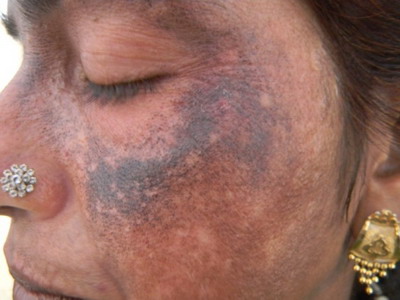Hydroquinone 8% is a high-strength skin-lightening agent used for treating hyperpigmentation conditions like melasma, dark spots, and post-inflammatory hyperpigmentation.
While effective, it comes with potential side effects, especially at higher concentrations or with prolonged use.
Table of Contents
Common Hydroquinone 8 Side Effects
- Skin Irritation: Redness, burning, itching, or stinging, particularly when first starting treatment.
- Dryness & Peeling: Can cause flaking, especially for those with sensitive skin.
- Increased Sensitivity to Sunlight: Skin becomes more prone to sunburn, requiring strict sun protection.
Less Common but Serious Side Effects (Including Long Term Hydroquinone Side Effects)
- Paradoxical Darkening (Exogenous Ochronosis): Long-term use, particularly in people with darker skin tones, can lead to bluish-black or grayish discoloration.
- Allergic Reactions: Rash, swelling, or severe irritation may occur in sensitive individuals.
- Skin Thinning: Prolonged use, especially if combined with corticosteroids, can weaken the skin barrier.
Rare & Severe Side Effects
- Systemic Absorption Issues: Though rare, excessive use over large areas can lead to systemic toxicity, affecting liver and kidney function.
- Carcinogenic Concerns: Some studies suggest potential risks in animal models, though this hasn’t been confirmed in humans.
Precautions & Safe Use
- Use under medical supervision, especially at 8% strength.
- Apply only to affected areas, avoiding excessive use.
- Pair with a broad-spectrum sunscreen to prevent further pigmentation.
- Avoid long-term continuous use (typically recommended for up to 3-4 months).
Hydroquinone is a widely used topical skin-lightening agent. It is popular due to its ability to effectively lighten dark spots, hyperpigmentation, and other skin discolorations.
Despite its effectiveness, hydroquinone has been associated with several side effects.
In this blog post, I will discuss the possible side effects of hydroquinone and provide product recommendations to mitigate them.
READ ALSO: Unveiling the Truth About 4 MCT Oil Side Effects: Separating Fact from Fiction
Hydroquinone is a chemical compound that inhibits the production of melanin in the skin.
Melanin is the pigment responsible for skin color.
By inhibiting melanin production, hydroquinone effectively lightens the skin.
READ ALSO: Dangers of Drinking Boost Today in 2025 & More
READ ALSO: 4 Side Bangs for Fine Hair Styles
4 General Hydroquinone Side Effects
However, prolonged use of hydroquinone can lead to several side effects, including:
- Skin irritation: Hydroquinone can cause skin irritation, redness, and itching. This is because hydroquinone is a strong chemical that can irritate the skin. It is recommended that you use hydroquinone in moderation and avoid using it on broken or irritated skin.
- Skin thinning: Prolonged use of hydroquinone can cause the skin to become thin and fragile. This is because hydroquinone inhibits the production of melanin, which also provides protection against the harmful effects of UV radiation. When the skin is thin, it is more susceptible to damage from the sun, which can lead to premature aging, wrinkles, and skin cancer.
- Uneven skin tone: Hydroquinone can cause the skin to become uneven in tone, leading to blotchiness and discoloration. This is because hydroquinone can inhibit the production of melanin in some areas more than others, leading to uneven skin tone.
- Ochronosis: Ochronosis is a rare but serious side effect of hydroquinone. It is characterized by blue-black pigmentation and thickening of the skin. Ochronosis can be irreversible and can occur with prolonged use of hydroquinone.

READ ALSO: The Ultimate Guide to the Best Moisturizer with SPF 2025
To mitigate the side effects of hydroquinone, it is important to use it in moderation and follow the recommended usage instructions. Additionally, there are several products that can help to reduce the side effects of hydroquinone.
Photo Credits: Beauty Harbour
READ ALSO: 5 Potential Yohimbe Side Effects You Might Suffer